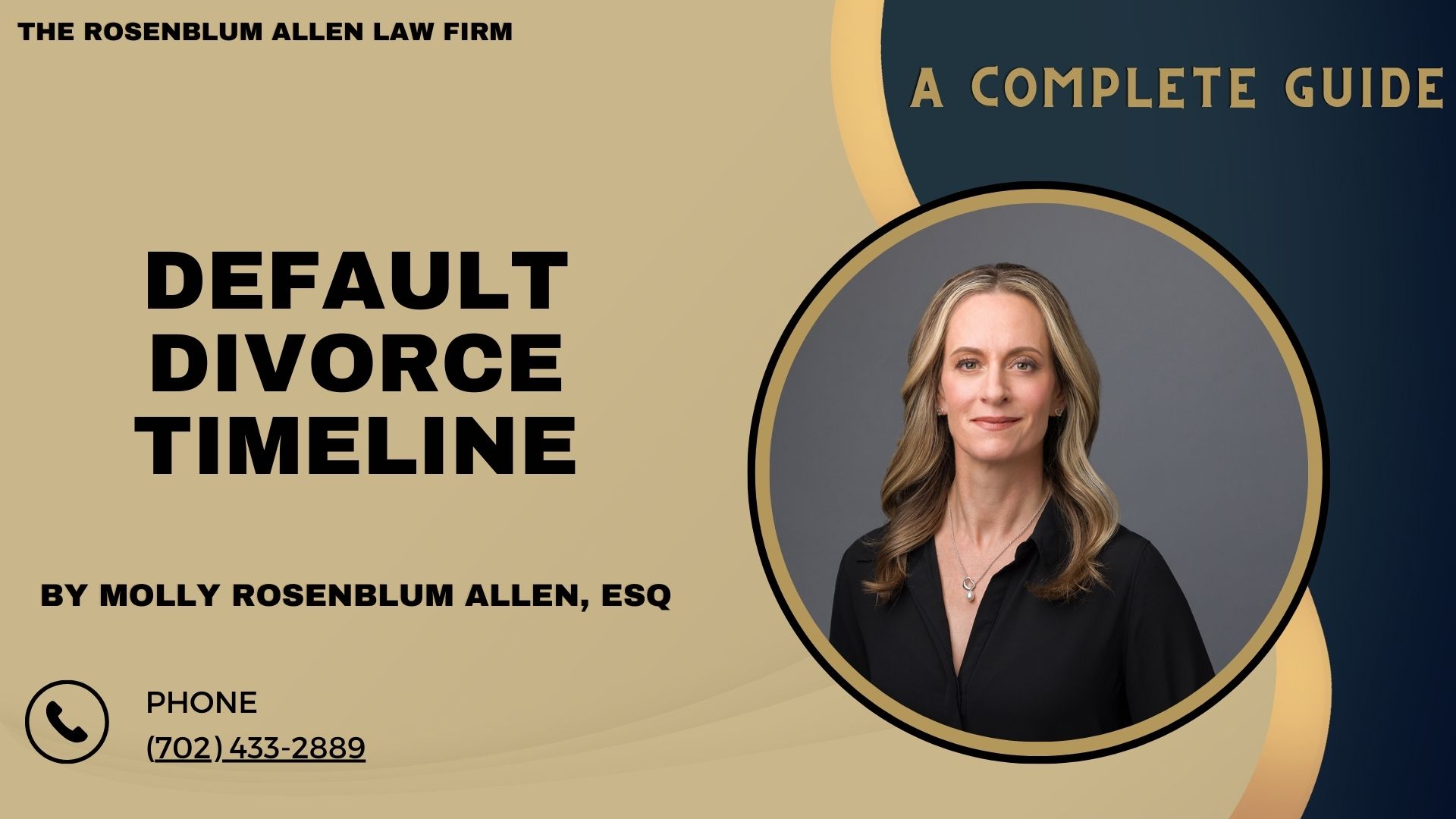Going through a divorce is tough. It’s not just an emotional rollercoaster but also a complex legal process. If you’re in Las Vegas and thinking about getting a default divorce, this guide is for you. It breaks down the timeline and steps in simple terms, helping you know what to expect.

Overview of Divorce in Las Vegas
Quick weddings may be a known feature of Las Vegas. But, divorces here follow a set process, especially default divorces. This is where one partner doesn’t respond to divorce papers.
Importance of Understanding the Default Divorce Timeline
Knowing the timeline helps you plan better and approach the process with a clearer mind. It’s about making informed decisions during a tough time.

Basics of Default Divorce in Las Vegas
Definition of a Default Divorce
This happens when one spouse files for divorce, but the other doesn’t respond. It lets you move forward without your partner’s input, following legal rules.
Legal Grounds for Divorce in Nevada
You don’t need to prove fault in Nevada. You can get divorced for: irreconcilable differences. Or, a year of legal separation. Or, two years of insanity.
Eligibility Criteria for Filing a Default Divorce
You or your spouse must live in Nevada for at least six weeks before filing. After serving divorce papers, your spouse must not respond within the set period.

Preparing for Your Default Divorce
Gathering Necessary Documents
You’ll need:
Financial records
Property documents
Your marriage certificate and any past divorce documents
Choosing the Right Legal Representation
Even though you can file on your own, a lawyer can simplify the process.
Benefits of Hiring a Divorce Attorney
They offer legal advice and handle paperwork.
They represent you in court, if needed.
How to Find the Right Attorney for Your Case
Ask friends or family for recommendations.
Look online for reputable lawyers in Las Vegas.
Talk to several attorneys to find a good fit.

Initiating the Divorce Process
Filing for divorce starts with submitting a Complaint for Divorce to the court. This document outlines your desire to divorce and how you wish to settle matters like asset division and, if applicable, child custody. Once filed, you must serve these papers to your spouse, officially notifying them of the divorce action.
Filing the Complaint for Divorce
Complete the divorce complaint form.
Include details about assets, debts, and, if relevant, child arrangements.
File it with the local court in Las Vegas.
Serving the Divorce Papers
Deliver the papers to your spouse or use a professional server.
Proof of service is needed for the court, showing your spouse received the documents.

Respondent’s Role and Response Time Frame
After receiving divorce papers, your spouse has a set period to respond. If they don’t, you can proceed with a default divorce.
Understanding the Response Period
Your spouse gets 21 days to answer if served in Nevada, or longer if served outside the state.
A failure to respond allows you to seek a default judgment.

The Default Divorce Timeline Explained
A default divorce doesn’t happen overnight. There’s a waiting period before the court finalizes the divorce.
Mandatory Waiting Period in Nevada
Nevada requires a specific time to pass after filing before granting a divorce. This period allows for possible reconciliation or response from your spouse.
Case Review and Finalization Process
The court reviews your divorce complaint and your spouse’s lack of response.
If everything is in order, the judge can issue a divorce decree, officially ending the marriage.

After the Divorce Decree
The final divorce decree outlines the terms of your divorce. It covers asset division and any child custody arrangements.
Enforcing the Divorce Decree
Sometimes, enforcing the terms needs legal action. This is especially true if your ex-spouse doesn’t follow the decree’s terms.
Modifying Divorce Orders
Life changes, and you may need to change your divorce decree. This requires returning to court and showing a significant change in circumstances.

Breaking It All Down
Understanding the initial divorce timeline in Las Vegas is crucial. It is for anyone going through this tough process. Each step needs care. You must prepare the needed documents and file the complaint. Then, you serve your spouse. Finally, the court issues a divorce decree. Facing a divorce can be scary. But, knowing what to expect gives some control and confidence in uncertain times.
It’s essential to remember that while this guide offers a roadmap, every divorce is unique. Your situation, court schedules, and your spouse’s actions can affect the timeline and outcome. So, you should ask a good divorce attorney in Las Vegas for advice. They can give personalized guidance for you.
Divorce marks the end of one chapter and the beginning of another. With proper prep and understanding, you can navigate this change more smoothly. You can start building toward a new future.

Frequently Asked Questions
What happens if my spouse contests the divorce after being served?
If your spouse contests the divorce after being served, the process shifts from a default to a contested divorce. This typically involves court appearances and mediation to resolve differences.
Can a default divorce be completed without a lawyer?
While it’s possible to complete a default divorce without a lawyer, the legal system can be complex. Filing paperwork correctly and navigating the process can be challenging. Seeking legal advice or representation is advisable to avoid potential pitfalls.
How do I serve divorce papers if I can’t locate my spouse?
If you can’t locate your spouse, you may request permission from the court to serve the papers through alternative methods, such as publishing them in a newspaper. Specific instructions will be provided by the court based on your circumstances.
What if my spouse is in another country?
Serving divorce papers abroad is complicated due to varying laws and requirements in different countries. It often involves additional steps and adherence to international treaties, such as the Hague Service Convention.
How long after the divorce can I remarry?
You can remarry as soon as your divorce decree is final. In Nevada, there’s no mandatory waiting period before remarrying after finalizing a divorce.
Are there any situations where the waiting period for a default divorce can be waived?
The mandatory waiting period in Nevada is generally required, but in rare cases, it may be shortened for emergencies with court approval.
What if my spouse responds after a default judgment is entered?
If your spouse responds after a default judgment but before the divorce decree is final, they may contest the terms of the divorce. Changing the divorce terms becomes more challenging after the decree is issued, typically requiring substantial justification.
How does a default divorce affect child custody and support?
In a default divorce, custody and support arrangements are based on the information and requests of the filing spouse. However, the court always considers the best interests of the children when making these decisions.
Can the terms of a divorce decree be changed after it’s finalized?
Yes, the terms of a divorce decree can be modified after the divorce, especially those related to child custody, visitation, and support. This usually requires demonstrating a significant change in circumstances.
What is the cost of a default divorce in Las Vegas?
The cost of a default divorce includes court filing fees, service fees, and potentially attorney’s fees. The total cost varies depending on the complexity of the case and whether legal representation is sought.

Glossary
Default Divorce: A type of divorce occurs when one spouse files for divorce and the other fails to respond within the given time frame, allowing the court to proceed without the respondent’s input.
Complaint for Divorce: The initial legal document filed by one spouse to begin the divorce proceedings. It outlines the grounds for divorce and the filer’s requests regarding asset division, child custody, and other matters.
Service of Process: The act of officially delivering legal documents, such as the divorce complaint, to the other spouse, ensuring they are informed of the legal action against them.
Respondent: The spouse who did not initiate the divorce filing is on the receiving end of the divorce petition.
Contested Divorce: A divorce in which the respondent disputes the terms proposed by the petitioner, leading to negotiations or court intervention to resolve the differences.
No-fault Divorce: A divorce based on irreconcilable differences, where neither spouse is required to prove wrongdoing by the other to obtain a divorce.
Divorce Decree: The final legal document issued by the court officially ends the marriage and outlines the divorce terms, including asset division, child custody, and support arrangements.
Mandatory Waiting Period: A legally required period that must pass between the filing of the divorce petition and the issuance of the divorce decree, intended to give couples time to reconsider their decision.
Child Custody: The legal determination of which parent will have the responsibility and authority to make decisions regarding the upbringing of their children.
Child Support: Financial contributions one parent requires to the other for the expenses involved in raising their children, determined during the divorce process.
Alimony: Financial support paid by one spouse to the other after a divorce, intended to provide for the receiving spouse’s living expenses.
Legal Representation: Hiring an attorney to provide legal advice and represent one’s interests in court proceedings.
Financial Statements: Documents detailing an individual’s economic situation, including assets, debts, income, and expenses, used in divorce proceedings to determine asset division and support obligations.
Asset Division: The process of dividing the marital property and debts between spouses as part of the divorce settlement.
Modification: A legal change to the terms of the divorce decree, typically concerning child custody, visitation, or support, based on a significant change in circumstances.

Additional Resources for You
As you navigate through your time of need, it’s essential to have reliable and comprehensive resources at your fingertips. Our lead attorney, Molly Rosenblum Allen, Esq., has meticulously created a range of valuable resources to support you. Whether you’re facing family law challenges, considering a name change, or exploring adoption in Nevada, these resources are designed to provide you with the knowledge and guidance you require:
Las Vegas Family Law Attorneys: A detailed guide for anyone seeking effective legal representation in family law matters in Las Vegas. Learn More
Family Court Las Vegas: Essential information and insights into navigating the family court system in Las Vegas. Discover More
Common Law Marriage in Nevada: Clarifying the myths and realities surrounding common law marriage in Nevada. Read Here
Name Change Las Vegas: A straightforward guide for anyone looking to legally change their name in Las Vegas. Find Out How
Nevada Power of Attorney: Insights into establishing a Power of Attorney in Nevada, a crucial step in managing your or a loved one’s affairs. Explore More
How to File a Motion in Family Court: Step-by-step advice on filing a motion in family court, a vital process for many legal actions. Get Started
Family Court Mediation: Understanding the benefits and process of mediation in family court cases. Learn the Process
Unbundled Attorney Services: An innovative legal service model that provides you with the specific legal help you need without the full-service price tag. Discover the Benefits
Nevada Adoption: A comprehensive guide to the adoption process in Nevada, offering hope and clarity for those looking to expand their family. Read More
These resources are designed to empower and assist you through various legal challenges and procedures. Molly Rosenblum Allen, Esq., and the team at The Rosenblum Allen Law Firm are committed to providing support and effective legal guidance when you need it most.

Outside Resources for You
American Bar Association (ABA): Offers a wealth of resources including articles, legal guides, and information on finding legal help across various law fields. Visit ABA
FindLaw for the Public: Provides a broad array of information on family law, divorce, and legal issues you might encounter. Explore FindLaw
Avvo: A platform where you can ask legal questions and receive answers from lawyers, as well as read legal guides and articles. Check Out Avvo
National Council of Juvenile and Family Court Judges (NCJFCJ): Dedicated to ensuring justice for every family and every child in courts throughout the country. Learn from NCJFCJ
Family Law Section of the State Bar of Nevada: Offers resources, articles, and information specific to family law in Nevada. Visit the Family Law Section
Psychology Today: While not a legal resource, it provides articles and advice on coping with divorce, stress management, and finding therapists. Explore Psychology Today
Mediate.com: Offers articles, resources, and information on mediation and resolving disputes without going to court, which can be particularly useful in divorce cases. Discover Mediate.com

A Special Message from Our Lead Attorney, Molly Rosenblum Allen, Esq

Dear Reader,
Thank you sincerely for taking the time to explore the resources we’ve put together. We hope you’ve found them helpful. They are for you as you navigate this hard time. Understanding family law is complex. This is especially true for divorce in Las Vegas. It is crucial. We aim to give you the best guidance.
Don’t hesitate to contact my team and me. You can do so if you are ready to discuss your situation and how we might help you. You can call us at (702) 433-2889. We’re here to listen. We want to understand your unique situation. We want to help you take the next steps with confidence and clarity.
Looking forward to the opportunity to support you,
Molly Rosenblum Allen, Esq.



